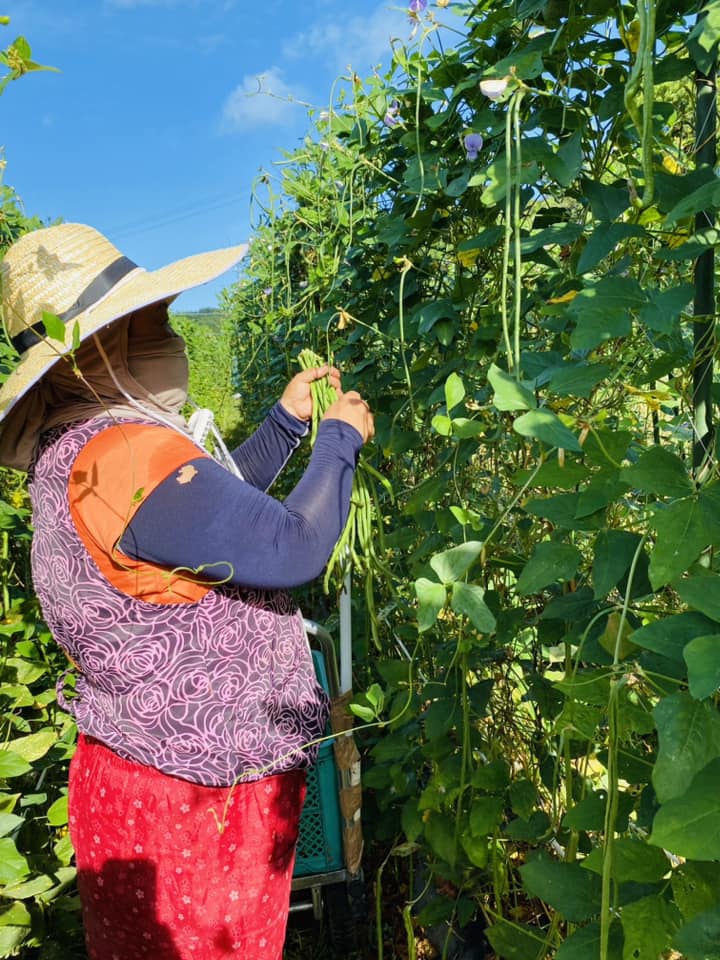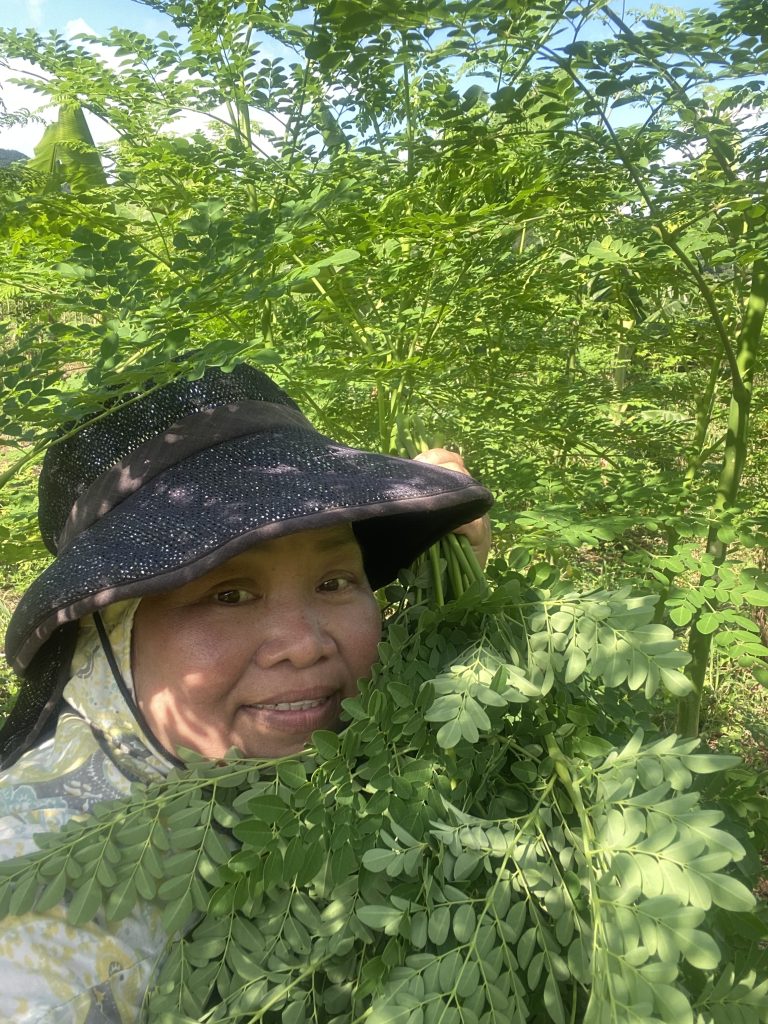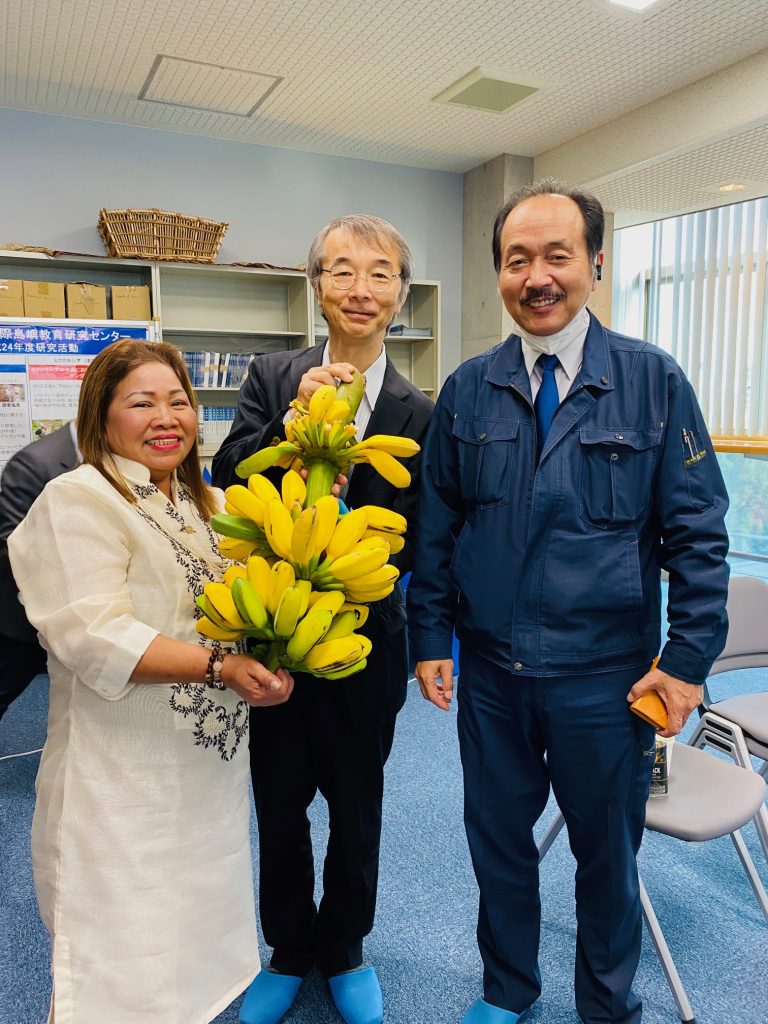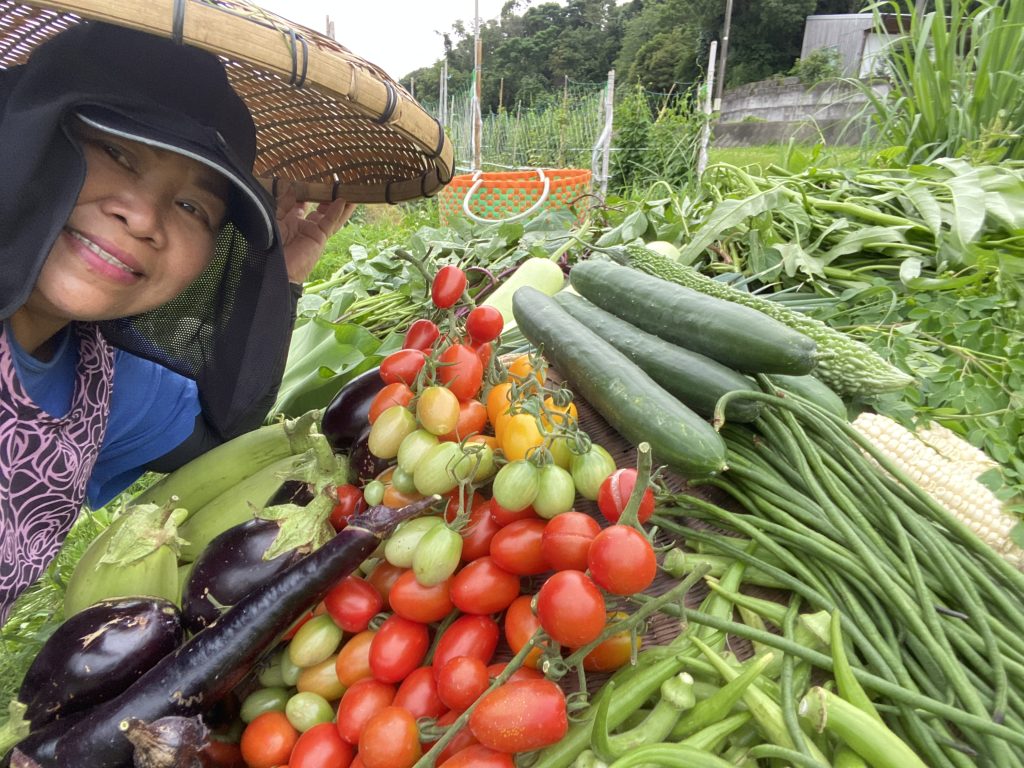Calm, focused and always moving, Alma Luceño shares her tranquil but fun and productive life on a farm in Japan.
From being a young girl planting bonsai trees and arranging flowers at her aunt’s flower shop in Davao to growing banana trees in Japan, Alma Dochi Luceño’s knack for growing plants allows her to mix planting with business.
Alma was no stranger to working on a farm. She used to sell poultry animals in the Philippines before becoming a talent scout sending Filipino workers to Japan. Her life changed when she met her Japanese husband in 2002. A modest wedding in her hometown sealed the year-long LDR. Afterwards, she left the Philippines in 2003 to start her expat life in Kagoshima, on Japan’s Kyushu island.

She knew that her husband was a farmer, but she was prudent enough not to pry into his business. “I thought he was joking when he told me I could work on the farm. So I looked for a job and he didn’t stop me. He respected my need to earn money as I was the breadwinner of my family.” She landed a job packing shiba leaves.
Farm life in Kagoshima
What started as a casual offer to help turned into a full-time commitment when one night, after coming from work, Alma saw her husband working so late. “He was harvesting green peas alone. I offered to help and he was happy to let me. I later learned that he would hire workers to help him harvest the crops.” Alma finally understood that she needed to help her husband.
He pointed to all the vegetables and fruit trees around us, all ours, he told me. His farm was vast. I saw a patch of land with beans and I asked him, can it be mine? I will harvest them and plant some more. He said, yes!
Alma Luceño
Alma quit her regular job and immersed herself into the world of agriculture cultivating potatoes, green peas and chicharo beans. She would later plant sili, sitaw, saluyot and malunggay trees.
Alma was loving her new life. What made her journey even more fulfilling was the unwavering support of her husband, who took pride in the dedication she was putting into the farm. Despite the land being his, he acknowledged her financial independence. “He gave me the money from the harvested crops and encouraged me to plant some more. The money I earn becomes a contribution to our household, covering expenses like gas, water, salt, sugar,” shares Alma in our online interview in her house in Kagoshima.

The dynamics on the farm gave Alma the life she had always wanted: simple and productive. She wakes up at sunrise and prepares her husband’s breakfast followed by a whole day of planting, harvesting, watering, feeding the cows, and cleaning the field. Her routine doesn’t end at the farm gate. “I help deliver our harvest to the Farmers’ Cooperative. They sell our produce to the market. I also cook peanuts in the evening, selling it to my Japanese and Pinoy clients working in clubs.”
At the end of a long day’s work, Alma lounges around in her garden surrounded by her potted crotons, a cup of hot coffee in her hand, admiring the view of the vast green field in front of the setting sun.
Banana plantation in Japan
Alma’s fondness for banana leaves inspired her to plant a banana tree in a region not typically associated with this tropical fruit. She was not only able to keep her tree alive, but she grew her banana plantation to 100 trees. Boasting three distinct banana varieties, each variety adds a layer of uniqueness to the farm, further enriching the cross-cultural exchange between Alma and the local community. “My Japanese neighbors do selfies in front of my banana trees as if they were tourist attraction.” Her live videos on TikTok flexing the vibrant foliage, the bearing of fruit, and the appearance of “puso ng saging” (banana heart) led to a surge in orders.
Her reels caught the attention of Kagoshima University which invited her to give a talk to teachers and students, followed by an educational trip to her farm. Her Japanese visitors learned not only about her agricultural achievements but also the significance of the banana tree in Philippine culture.
“It was the proudest moment of my life,” beams Alma.

Alma also ventured into another business project. Because of her initial struggle of finding Filipino products in Kagoshima, she set up the first sari-sari store catering to the growing number of Filipino expatriates in the area. “The first time I ordered a box of bangus and tilapia from a Filipino shop in Tokyo gave me another business idea.” Word of mouth gave Alma’s business a big boost especially after posting videos on her social media accounts. She shares her success with her family back home by putting up a grocery store and meat shop for her siblings.
However, farm life isn’t without its challenges. “Most of the young Japanese workers migrate to larger cities so it is hard to find people to help us. So we hired some kababayan. I have now two Filipinos helping me regularly.” The impact of nature’s fury between July and September leaves Alma and her husband dealing with ruthless typhoons that swipe the farm almost bare.
We don’t have a choice but to be resilient all the time just like our okra plant.
Alma Luceño
With the help of her husband who goes to agricultural seminars, Alma ensures sustainable farming by choosing the right fertilizer for her crops, those regulated and approved by the government.
Going with the flow
Alma’s life in Japan is also about community and giving back. Serving as a bridge between the Filipino and Japanese cultures, she actively participates in the local Filipino community’s affairs, holding leadership positions and promoting camaraderie among expatriates.
At 55, she embodies the values of hard work, adaptability, and gratitude. Her advice to fellow Filipinos abroad echoes her life philosophy: “Don’t waste time, work hard. Let’s use time to seize opportunities. I see some kababayans who are addicted to pachinko, wasting their money away. I feel sad. I can’t afford to waste time, or my plants will die.”

Alma describes herself like a “busay”, a waterfall, continuously flowing. Her farm has become a harmonious blend of culture, resilience, and growth, not only as a source of sustenance but as a symbol of her passion, meeting the fertile soil of opportunity and finding joy in small things.
What's Your Reaction?
Nats Sisma Villaluna has been serving the Filipino community in Spain for more than 15 years. His volunteer works include teaching Spanish to Filipinos, and as artistic director of the Coro Kudyapi, a group of musically inclined young Filipinos in Barcelona. His passion to serve the Filipino community now extends to other countries in his role as Publisher and Editor-in-Chief of the new The Filipino Expat Magazine.



